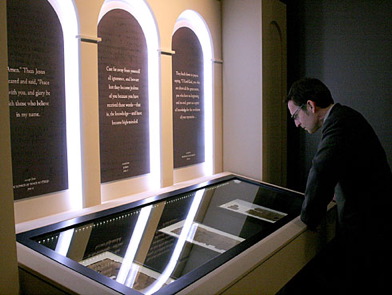Irenaeus and the Gospel of Judas

Is the Gospel of Judas that is receiving so much attention this week the same Gospel of Judas mentioned by Irenaeus, a second-century bishop and apologist for the faith? Some want to claim that it is thereby cementing a date of writing for the Gospel of Judas at least as early as 170-180 AD--as if an earlier date would add to its credibility. Having looked at Irenaeus' words on the the subject, I'm not convinced they're one and the same.
In Against Heresies, ch. 31 Irenaeus devotes his attention to a gnostic group that he calls "the Cainites." Below is his description of the groups' teachings as recorded in the particular extra-biblical Gospel of Judas with which he is familiar.
Others again declare that Cain derived his being from the Power above, and acknowledge that Esau, Korah, the Sodomites, and all such persons, are related to themselves. On this account, they add, they have been assailed by the Creator, yet no one of them has suffered injury. For Sophia was in the habit of carrying off that which belonged to her from them to herself. They declare that Judas the traitor was thoroughly acquainted with these things, and that he alone, knowing the truth as no others did, accomplished the mystery of the betrayal; by him all things, both earthly and heavenly, were thus thrown into confusion. They produce a fictitious history of this kind, which they style the Gospel of Judas. (Irenaeus, Against Heresies 31:1)
Now, if you downloaded the National Geographic Society's translation of the Gospel of Judas and actually read any of it, you may have noticed that much of what Irenaeus describes above is not found in the document we currently have. There is no mention of Esau, Korah, or the Sodomites. Most significantly, there is no mention of Cain which is supposed to be a core figure in the history Irenaeus says is described in the Gospel of Judas with which he is familiar. Yes, Sophia (as the personification of wisdom) is mentioned, but that is fairly common for many of these gnostic writings.
Now to be fair, you may have noticed that the Gospel of Judas manuscript we have is incomplete. Perhaps, some of these missing features are found in the parts of the text that are missing. Maybe...but maybe not. I'm not an expert in these things by any means, but I've read my share of Gnostic writings, and the Gospel of Judas that we currently have certainly feels like the Nag Hammadi texts of a century later such as the infamous Gospel of Thomas.
But let's play devil's advocate for a minute. What if it was earlier? What if it is the same as Irenaeus's Gospel of Judas and thus it is decidedly given a second century date. Does this matter? Should we join in with the sensationalistic view that perhaps the Gospel of Judas is a contender as a fifth gospel?
In a word...no.
There are New Testament references to other writings that aren't in our New Testament. There's at least one other letter written by Paul to the Corinthians that we don't have. There is a letter he wrote to the Laodiceans. But even if we found these letters, they wouldn't warrant inclusion into the New Testament because they were rejected by the early church as being neither authoritative nor inspired. That's probably also why we don't have these letters anymore. And the Gospel of Judas was probably considered insignificant in its time or immediately afterwards, which is why we have only one extant copy to this day and why it took 1700 years to find it. And there are dozens of other writings by Christians, even much earlier than the Gospel of Judas that did not make it into the New Testament. Consider the Shepherd of Hermas, the Didache, the Epistle of Barnabas. Although these are edifying reading, they are not considered inspired or authoritative.
The reason that the Gospel of Judas does not warrant inclusion into the New Testament is because the New Testament canon is closed. This is a matter of theology and history. Even if it were determined that the Gospel of Judas was written in the first century, it still would not qualify for inclusion into the NT. The early church had certain litmus tests for what was chosen to stand alongside the Hebrew Scriptures as sacred canon. This included whether or not a document was written by an apostle or at least by someone who had direct access to apostolic witness. Also there was the issue of whether or not the early church viewed a writing as authoritative and bearing the marks of being inspired by the Holy Spirit.
As I directed in the previous post, I still recommend F. F. Bruce's The Canon of Scripture as highly recommended reading on the subject of why our New Testament takes its final form.
I'll admit that the discovery and translation gospel of Judas is interesting. I've probably downplayed that fact in reaction to all the unnecessary hype that the document is receiving.
And I agree that it should be studied further. But I believe it should be studied for what it is--a representative of 3rd/4th century Gnostic writings, not a contender for a fifth gospel in the New Testament.









